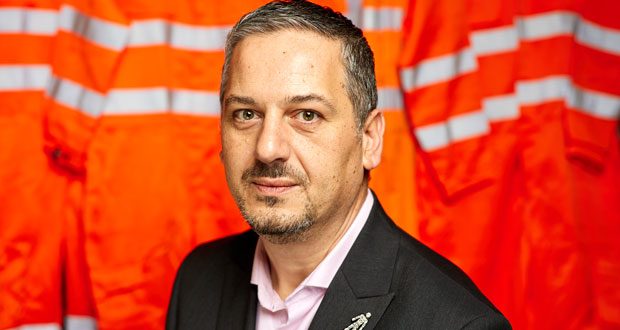The textile industry has been accused of “shirking its moral responsibilities” by not tackling the toxic “forever chemicals” still used in garment manufacture around the world.
Despite the known environmental and health concerns of PFAS chemicals, the textile industry continues to use them in garment production because of their stain and water repellent qualities, flame retardancy and low cost, says phs Besafe.
“As one of the biggest contributors to the PFAS problem, it is time that the textile industry stepped up and took action. We have a responsibility to do the right thing.” said Rob Piazza, Sales Director at phs Besafe, which provides commercial laundry services and technical workwear, including high visibility and flame-retardant garments.
“PFAS are everywhere. They are impacting every aspect of our environment, including our food and water supplies, and they have made their way into almost every human’s body. The impact is catastrophic, but the government continue to lag behind the US and Europe with legislation restricting or banning their use. The textile industry needs to do more to replace PFAS and do the right thing.”
PFAS (Poly and perfluoroalkyl substances), or ‘forever chemicals’, are a group of over 4,700 man-made chemicals that cannot be broken down. Although they are used in everything from frying pans to beauty products, the textile industry accounts for up to half of the total use of PFAS due to their performance and liquid-repellent and flame-retardant qualities on clothing.
PFAS chemicals accumulate in the environment and inside our bodies and are known to cause damage to the planet and serious health problems, including cancer, infertility, immune problems and high cholesterol.
“It is alarming to see and more needs to be done in the textile industry to fund the necessary research and development into more alternatives to PFAS, or to use the alternatives that have already been developed,” added Piazza.
PFAS is often manufactured into the fabric of garments and added to finished items as an impregnation, finish or membrane to repel stains, water and even chemicals. PFAS re-treatment should be common practice in commercial laundries which are washing technical workwear and PPE in order to ensure the garment maintains its water and stain repellent properties.
phs Besafe has made the commitment to ban or restrict PFAS from its services wherever alternatives are available.
The team has been working with Ecolab, a global sustainability leader that offers environmental solutions to businesses, for the last six years to ensure phs Besafe has PFAS-free laundry treatments for all the specialist workwear it washes at its commercial laundries.
They also have a long-term partnership with industry-leading manufacturer Tranemo Advanced Workwear to ensure they can supply customers with the highest quality, PFAS-free workwear garments wherever a PFAS-free alternative is available.
“Unfortunately, the general focus in the UK is on manufacturing and treating garments at the lowest possible cost. That usually means using PFAS chemicals, which are cheap and easily available, despite the risk they pose to our planet and the end user,” added Piazza.
“We don’t feel this is the way to do business and we choose to work with partners that share our sustainable and innovative ethos, so we can start to make improvements in the textile industry together. Someone must make some noise about this.”
PFAS are not currently subject to many UK restrictions. Just two of the 4,700 chemicals are regulated. The Health & Safety Executive released a report in April 2023 following the most comprehensive British analysis of PFAS chemicals. The report makes a number of recommendations including limiting the use of PFAS-containing foams as well as the use of PFAS in textiles, furniture and cleaning products.
It was published under UK REACH, which is a regulation that applies to the majority of chemical substances that are manufactured in or imported into Great Britain.
HSE, as the Agency for UK REACH, will work with the Environment Agency and the appropriate authorities to consider the recommendations, and how action on these recommendations will be set out in the forthcoming UK REACH Work Programme for 2023-24.
The regulation of PFAS chemicals varies globally. In the US, there are proposed bans starting as early as 2030 and many states propose to severely limit or ban PFAS altogether in advance of federal regulations. In the European Union, the use of some PFAS has already been restricted or banned in its entirety. Denmark in particular is making a strong stand against PFAS, already banning it in food packaging.
“Sadly, we are still waiting for the UK to have its ‘PFAS epiphany’,” said Danny Hemmings from Tranemo Advanced Workwear.
“One of the issues is the UK’s current attitude to textiles. They want them fast and cheap, and quality and sustainability are further down the list. We need a culture shift, where value is placed on doing the right thing and health, safety and well-being are the drivers of the market.
“End users must look at the whole supply chain and find out how garments are being made, and then ask whether that kind of manufacturing is acceptable. People need to ask questions about PFAS and put pressure on manufacturers to make changes and do better.”
Tranemo UK, a subsidiary with its headquarters in Sweden, launched the world’s first alternative to PFAS in technical workwear two years ago, after five years of research and development. Six of its ranges are already PFAS free and it aims to be entirely PFAS free by 2025 as it continues to try and develop PFAS alternatives for chemical splash workwear, which currently do not exist.
Textile Services Association CEO David Stevens said: “The TSA and the industry are keen to support the move away from the use of PFAS within textile manufacture and retreatments where alternative products are available. We are mindful that PFAS currently does provide essential PPE to many frontline workers and therefore understand that it is a complex solution. We are actively encouraging and are aware that the supply chain is working to find alternative products and we are keen to support this process as well as promote this journey.”
Piazza added: “The industry and the government need to take responsibility and direct innovation and funding towards sustainable alternatives to help us to drive real change in this industry and beyond.”





